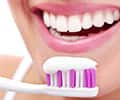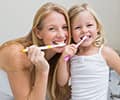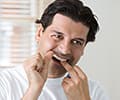1. Brush First Thing
BEFORE BREAKFAST
Get in the habit brushing your teeth as soon as you wake up. Not only is it pleasant to have a fresh mouth as you greet the day, brushing right away cleans any bacteria that's formed overnight, preventing your breakfast (and coffee) from getting mired in the sticky plaque.
TIP: To freshen up after breakfast, rinse with mouthwash. In a pinch, rinse with water — the goal is simply to wash away leftover food particles.
2. Set a Timer
2 MINUTES
Lots of people brush regularly, but they don't brush long enough to effectively remove plaque. Every time you brush, set a timer for 2 minutes to make sure you're brushing for the entire recommended time slot.
TIP: Make brushing something to look forward to by listening to a song, watching the news, catching up on a podcast.
3. Scrape Your Tongue
TWICE PER DAY
After brushing, reach for a tongue scraper. Gently scraping your tongue to remove plaque can help get rid of bacteria that could otherwise end up on your teeth. Flossing every evening will help you get ahead of the bacteria game, as well.
TIP: Tongue scraping can help keep bad breath at bay, as can flossing.
4. Avoid Soda
USE A STRAW
If you must drink sugary drinks such as soda, try using a straw to keep the beverage away from your teeth. It's best to cut out sugary drinks entirely because consuming sweet beverages is linked with health issues ranging from tooth decay to increased mortality.
TIP: Make it easy to reach for a straw by keeping a reusable metal straws in your utensil drawer, in your car, and at the office.
5. Crunch Those Veggies
FIND A FAVORITE
The USDA's dietary guidelines suggest that adults eat 5 to 13 servings of fruit and veggies a day as part of a balanced diet. And opting for crunchy veggies regularly can help keep your mouth healthy. Chewing stimulates production of saliva, which acts as a natural mouthwash.
TIP: Pick a favorite raw veggie such as carrot sticks and keep it in your regular snack rotation.
This article is intended to promote understanding of and knowledge about general oral health topics. It is not intended to be a substitute for professional advice, diagnosis or treatment. Always seek the advice of your dentist or other qualified healthcare provider with any questions you may have regarding a medical condition or treatment.
ORAL HEALTH QUIZ
What's behind your smile?
Take our Oral Health assessment to get the most from your oral care routine
ORAL HEALTH QUIZ
What's behind your smile?
Take our Oral Health assessment to get the most from your oral care routine
Join Us
Get the best of your oral health routine and take it to the next level with expert advice, recommendations, products and solutions and special offers.
Join Us
Get the best of your oral health routine and take it to the next level with expert advice, recommendations, products and solutions and special offers.






.jpg)








